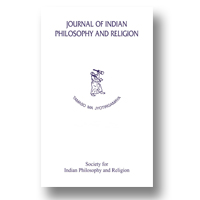|
|
|
1.
|
Journal of Indian Philosophy and Religion:
Volume >
14
K. R. Sundararajan
One and many-the Ontology of change in Ramanuja and Bhaskara
view |
rights & permissions
| cited by
|
|
|
|
|
|
|
2.
|
Journal of Indian Philosophy and Religion:
Volume >
14
Alan Preti
Mysticism and Brahman-realization
view |
rights & permissions
| cited by
|
|
|
|
|
|
|
3.
|
Journal of Indian Philosophy and Religion:
Volume >
14
Nancy Snow
Shedding Colonialized Identities:
A Comparison and Contrast of Gandhi and Fanon
view |
rights & permissions
| cited by
|
|
|
|
|
|
|
4.
|
Journal of Indian Philosophy and Religion:
Volume >
14
J. Randall Groves
Musical Memes and Cultural Colonization
view |
rights & permissions
| cited by
|
|
|
|
|
|
|
5.
|
Journal of Indian Philosophy and Religion:
Volume >
14
David Dillard Wright
Breath of Wisdom:
Towards a Philosophy of Respiration and Circulation
view |
rights & permissions
| cited by
|
|
|
|
|
|
|
6.
|
Journal of Indian Philosophy and Religion:
Volume >
14
Itay Ihrl
The Unique Mysticism of Spinoza and Nagarjuna
view |
rights & permissions
| cited by
|
|
|
|
|
|
|
7.
|
Journal of Indian Philosophy and Religion:
Volume >
14
Keya Maitra
Meanings of 'Multiculturalism':
Can Philosophy be Taught from a truly Multiculturalist Perspective?
view |
rights & permissions
| cited by
|
|
|
|
|
|
|
8.
|
Journal of Indian Philosophy and Religion:
Volume >
14
Ajay Verma
Bhartrhari's Verbal Holism:
Some Hermeneutical Queries
view |
rights & permissions
| cited by
|
|
|
|
|
|
|
9.
|
Journal of Indian Philosophy and Religion:
Volume >
14
Frank Chappel
The conceptualization of gods in Hindu communities and Universal aspects of the Divine
abstract |
view |
rights & permissions
| cited by
The modem Hindu understanding of divinity has been preserved throughout the history of the religion by the ritual practice of successive generations of believers. Coming to understand the cultural origins and elaborations of the Hindu perception of the Divine can be perplexing to the individual situated in a Judeo-Christian cultural context. Likewise, making sense of Hindu ritual may also be confusing to the Westerner considering the negative light "idol worship" has been given by Judaism and Christianity. The purpose of this paper is to investigate Hindu ritual via participant observation in an effort to comprehend the creation and transmission of the Hindu community's perception of the divine. The ethnographic data gathered herein supports a unique and often forgotten paradigm of religion as a system of bonds within a kinship structure originally perpetuated by William Robertson Smith. In light of such data, the application of Robertson Smith's theoretical perspective, and more modem interpretations of ancestral cult worship, significant light may be shed on the relationship of the contemporary Hindu to their pantheon and permits one to understand the cultural perception of god(s) as integrated members of the believing community. These results support an interpretive paradigm of Religion as a system of bonds created via a process of abstraction of familial bonds that may be applied more broadly to many conceptualizations of gods and ancestors cross-culturally.
|
|
|
|
|
|
|
10.
|
Journal of Indian Philosophy and Religion:
Volume >
14
Kisor K. Chakrabarti
AAtmatattvaviveka (Analysis of the Nature of the Self) An Annotated Translation:
The Argument from lacking Productivity Simultaneously and Successively
view |
rights & permissions
| cited by
|
|
|
|





